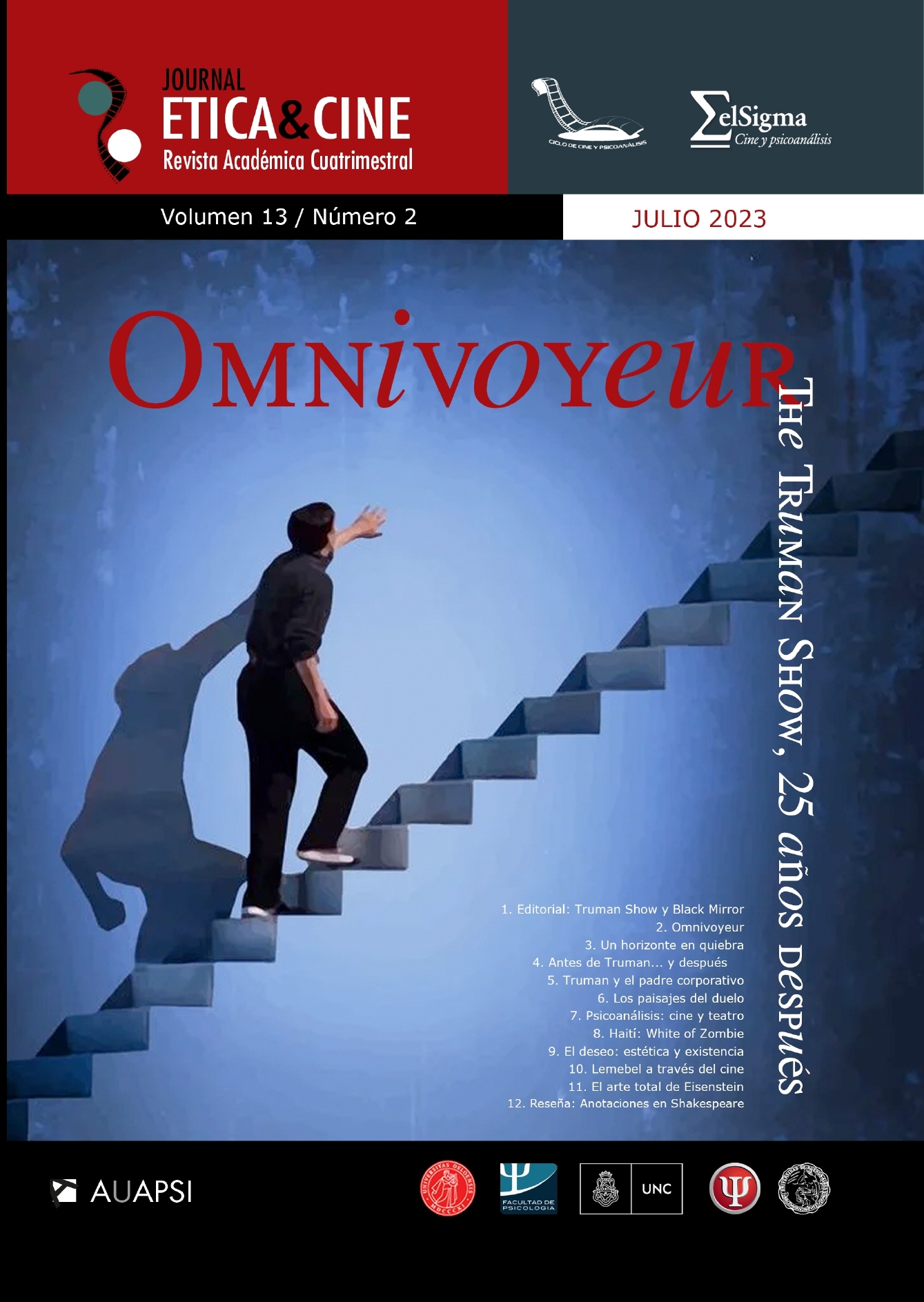Truman and the Corporate Father
DOI:
https://doi.org/10.31056/2250.5415.v13.n2.41966Keywords:
Corporate Adoption, Superego Parent, Pure Parent, Milgram ExperimentAbstract
On the occasion of the 25th anniversary of The Truman Show, the purpose of this text is to revisit Peter Weir’s film (1998) in light of two main sources: Open Sea (A Bankrupt Horizon) by Juan Jorge Michel Fariña, an article published a year after the film’s premiere (1999), and Parents in Cinema: Films in Dialogue (2022), the latest book by Eduardo Laso. Drawing from the first source, this analysis aims to delve into the comparison of Truman’s paternal figures (Christof, the corporate father, and the fake father assigned to him by the reality show) with the fathers of appropriated babies during the Argentine military junta’s dictatorship from 1976 to 1983, recognizing the bonds based on the falsification of identity in both contexts. The concept of a corporate-scale superego is introduced, employing tools from group psychology and a typology of parents, the latter supported by the aforementioned second source. Rethinking The Truman Show entails the challenge of updating it and drawing conclusions about the nature of the relationships formed between information senders and receivers within the current communication landscape. After all, a classic is a film that remains relevant despite the passage of time.
References
Referencias bibliográficas
Han, B.C. (2014). En el enjambre. Herder.
Lacan, J. (1988). Dos notas sobre el niño. En Intervenciones y textos 2. Manantial.
Laso, E. (2022). Padres en el cine. Películas en interlocución. Fundación Medifé.
Laso, E. (2023). Reseña de libro: “El padre en la apropiación de niños”. Aesthethika, Revista Internacional sobre Subjetividad, Política y Arte, 19(1).
Michel Fariña, J.J. (2013). Addenda, Milgram con Freud y Lacan. Aesthethika, Revista Internacional sobre Subjetividad, Política y Arte, 9(1).
Olivares Waisman, L. (2013). El “reality” delator. Una ventana demasiado indiscreta. G. Simón (Coord.) y L. Raso (Colab.) Lecturas semióticas. Editorial UNSJ.
Referencias filmográficas
Chazelle, D. (director) (2014). Whiplash [Película]. Sony Pictures Classics.
Hicks, S. (director) (1996). Shine [Película]. South Australian Film Corporation; Film Finance Corporation Australia.
Miller, B. y Moss, E. (productores) (2017- ). The Handmaid’s Tale [Serie]. MGM Television; Hulu.
Ripstein, A. (director) (1973). El castillo de la pureza [Película]. Estudios Churubusco.
Weir, P. (director) (1986). The Mosquito Coast [Película]. The Saul Zaentz Company; Jerome Hellman Productions.
Weir, P. (director) (1998). The Truman Show [Película]. Estados Unidos: Paramount Pictures.
Welles, O. (director) (1941). Citizen Kane [Película]. Mercury Productions; RKO Pictures.
Downloads
Published
Issue
Section
License
Copyright (c) 2023 Ética y Cine Journal

This work is licensed under a Creative Commons Attribution-ShareAlike 4.0 International License.
Los autores que publiquen en Ética y Cine Journal aceptan las siguientes condiciones:
Los autores/as conservan los derechos de autor © y permiten la publicación a Ética y Cine Journal, bajo licencia CC BY-SA / Reconocimiento - Reconocimiento-CompartirIgual 4.0 Internacional. La adopción de esta licencia permite copiar, redistribuir, comunicar públicamente la obra, reconociendo los créditos de la misma, y construir sobre el material publicado, debiendo otorgar el crédito apropiado a través de un enlace a la licencia e indicando si se realizaron cambios.

Este obra está bajo una licencia de Creative Commons Reconocimiento-CompartirIgual 4.0 Internacional.




